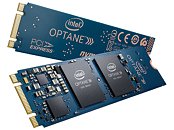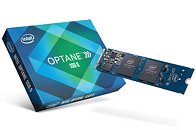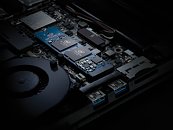Thursday, March 8th 2018

Intel Announces Optane 800p Series M.2 NVMe Cache SSD
Intel today announced the Optane 800p series M.2 NVMe cache SSD. This series succeeds the original Optane Memory series, which came in 16 GB and 32 GB capacities. The new Optane 800p comes in 58 GB and 118 GB, and offers acceleration to a HDD or slower SSD-based machine, just like the original. It can also be used as a standalone SSD since it's big enough to hold an OS installation and some software. Intel also encourages buying two or more of these drives for NVMe RAID.
The drive is built in the M.2-2280 form-factor, and takes advantage of PCI-Express gen 3.0 x2 interface. Both the 58 GB and 118 GB variants have identical performance numbers from Intel: up to 1450 MB/s sequential reads, up to 640 MB/s sequential writes, up to 250,000 IOPS (8 GB span) random reads, and up to 145,000 IOPS (8 GB span) random writes. Endurance is where 3D XPoint memory begins to shine, both variants have their endurance rated at 365 TBW. Available now, the Optane 800p 58 GB is priced at USD $129.99, while the 118 GB variant goes for $199.99.
The drive is built in the M.2-2280 form-factor, and takes advantage of PCI-Express gen 3.0 x2 interface. Both the 58 GB and 118 GB variants have identical performance numbers from Intel: up to 1450 MB/s sequential reads, up to 640 MB/s sequential writes, up to 250,000 IOPS (8 GB span) random reads, and up to 145,000 IOPS (8 GB span) random writes. Endurance is where 3D XPoint memory begins to shine, both variants have their endurance rated at 365 TBW. Available now, the Optane 800p 58 GB is priced at USD $129.99, while the 118 GB variant goes for $199.99.



23 Comments on Intel Announces Optane 800p Series M.2 NVMe Cache SSD
Whats the point of inventing product with sole purpose of speeding up old drives/PC, but its not compatible with anything older then 6 months?
SSD Caching is a much better solution to hybrid drives that seem to be questionable reliability and would save a lot of money over outright buying a full SSD. Trouble is, where it used to have no limits, now it's limited to the point you might as well just buy a full SSD. The makers of the caching software got bought up and their creation promptly killed.
Then the only ones left doing it is Intel and they want a premium to do it by imposing hardware limits which aren't necessary.
Just no win solution for consumers that keeps driving NAND prices up as people are forced to buy full SSD drives.
The 32GB version is still very relevant.
I do understand the confusion of people who haven't had the chance to experience Optane drives as HDD cache.
Also, this is compatible with anything that offers a M.2 NVMe port, but I won't let meaningless details get in the way of a good hating.
Anandtech's review of 800p
www.anandtech.com/show/12512/the-intel-optane-ssd-800p-review/9
It just annoys me that Intel limits this to 64GB, when now they are allowing over 100GB with Optane. Their claim before was they didn't feel that over 64GB was worth it for caching, but obviously they've changed their mind. So why not unlock the size limit for regular SSD too?
Sure it's expensive, sure 118GB doesn't cut it for everyone (much less 58GB), but these do not make it a cache drive exclusively, that's all I'm saying.
All those times when you look at the screen waiting for an app and the CPU is not pegged at 100% usage, your system is doing I/O. I see that way more frequently than my system being held back by the CPU. And I only have a "measly" quad core.
I'm not saying Optane is going to make all that go away (obviously, sice I haven't tried one), but the general rule when optimizing the performance of a system is to determine which part is the slowest, how much is it being used and focus on that. The slowest part in a HDD-free system today is small, random reads for the flash. I do not see why I would fault a product that improves precisely on that. I mean, this product is in its infancy, it comes with its associated problems (and i've acknowledged that), but to say its only reason for existing os to be cache drive is "a little" out there.
Sure, the SATA SSD might be the limiting factor, but the delays it is causing are so small that making them smaller isn't noticeable to the typical user.